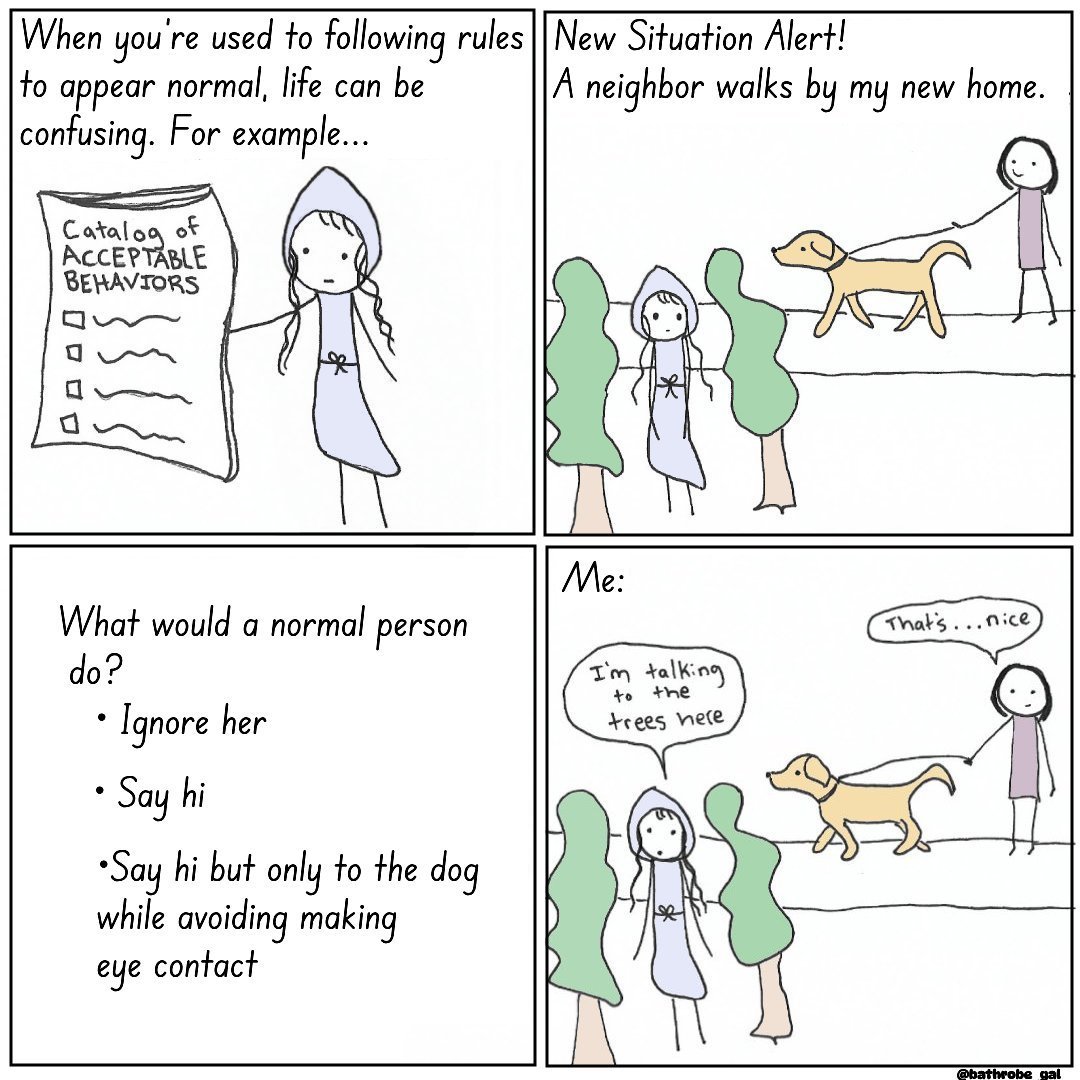
Contents
August 2025 • Vol. 1, Nr. 4
Editorial Dept.
Annie Mydla
Sol Iacob
Cover
Elissa Fox
Intro
About Autistic Women's Group • Annie Mydla
Trigger warning: Suicidality and stigma against medication
Essay
A Girl Goes to Ecuador • Stevie Lou Díaz
A Girl Goes to Ecuador • Stevie Lou Díaz
Trigger Warning: Threat of sexual assault, substance use
Autism Chrysalis Life Coaching
Guilt-Free Progress Tracker for AuDHDers • Heather Cook
Guilt-Free Progress Tracker for AuDHDers • Heather Cook
Flash Essay
Brief Thoughts on Writing • Christina Donaldson
Brief Thoughts on Writing • Christina Donaldson
Poem
Why it's so hard for me • Hannuh Frings
Why it's so hard for me • Hannuh Frings
Short Story
My sweet daughter. I love you so much • Gina Quigley
My sweet daughter. I love you so much • Gina Quigley
Comics
Bathrobe Gal: "Normal" • Sarah Jane Cody
Sticker
Therapy Junkie • Elissa Fox
About Autistic Women's Group
Established 2021
AWG is an online support group for late-identified autistic women and all other members of marginalized genders. The meeting format is designed to reduce the sensory, social, and executive function burdens that normally come with socializing. Our members are clinically-diagnosed, self-diagnosed, and questioning. AWG is volunteer-led and not associated with any other umbrella organization or company.
Please consider joining us on Zoom. Our member profile is inclusive. Meetings are always free and no registration is required. Members share by speaking or typing. We also have many members who come just to listen. You never have to turn on you mic or camera if you don't want to. You don't have to come to every meeting, or stay the whole meeting, in order to be a full member. Disclosure of diagnosis/gender identity is welcome but never required for participation.
Click her to learn more about attending a meeting. You can also...
- See upcoming meeting topics
- Sign up for meeting reminders (scroll the homepage to find the signup form)
- Join the AWG subreddit
I hope you enjoy AWG Shares Magazine. And please do join us in a meeting sometime if you can.
Annie Mydla
Founder and facilitator, AWG
Premonitions
by Alëna Korolëva
alenakoroleva.com
Whenever I go, I can't help but notice signs of a looming change. I eavesdrop on conversations of creatures big and small, and like me, they seem uneasy and uncertain about what's to come. Something is in the air, dark clouds gather, winds are shifting course. Amidst the confusion and restlessness, the voices of non-human and human worlds blend in a worrisome symphony. This piece is an ode to anticipation, to the beauty of different forms of life on the brink of the sixth mass extinction. Joining in the chorus are the American toad, northern winds, an old kettle, Mr. Cat, tawny owl, crickets, domestic chickens and pigs, trumpeter swans, honey bees, truck horns, cormorants, seagulls and other elements and critters.
Commissioned by Radiophrenia Glasgow. Cassette release on Form of Minutiae (Berlin, Germany), March 2024. With Chaika Chekhov improvisations on trumpet.
And though she’s not really ill, there’s a little yellow pill
Emmie
Trigger warning: Suicidality
Let's talk about pills. The Rolling Stones released a song in 1966 titled Mother’s Little Helper wherein they derisively tell the story of a bored middle-class housewife abusing valium in order to “help her through her day.” It’s clear Jagger and Richards find this tale absurd and off-handedly mention a mounting abuse of the pill and a possible overdose.
The casualty that permeates this song seems to persist in today’s society, and its easy to paint a picture of widespread pill use as a “little helper” for those bored with their lives.
In case you’re curious, I am speaking from experience. I’ve taken Valium, I’ve also taken Ativan, and I currently take Xanax on a regular basis. I feel just a little qualified to speak on this topic, though I’ll limit my comments to my own personal knowledge.
So, just how helpful is mommy’s little helper? Well, let me paint you a different picture. The story starts off rather non-eventfully, you move through your day with a low level of difficulty, but somewhere in the back of your consciousness you feel something is amiss. Not quite sure how to classify the vague warning you push on with your day. The day goes by and the subtle warning is now a hurricane siren, ringing somewhere closer and clearer than before, and you have a sinking feeling that the other shoe is going to drop. Soon.
The feeling builds and you can’t pinpoint how exactly it began or how long you’ve been incoherent but suddenly you feel as though you’ve re-entered the world. You’re lucid, but you’ve lost time, and you realize you’re laying on the floor gasping for air. Your vision is blurry and your face is streaked with tears. As you begin to feel your body again you realize you have ice packs on your neck and your chest, and someone is holding your hand.
Slowly things piece back together and you’re not quite sure how to classify what’s just happened. A panic attack? No, you’ve had those before, but this was different. Yes, this episode lasted for nearly an hour.
This is where I was. On the floor of my living room. Completely paralyzed, I couldn’t even feel the tears as they streamed down my face, and I could barely hear my mother as she tried to remind me to breathe. My ears were ringing, and I couldn’t control my breathing. Oddly enough, I wasn’t panicking. It was as if my mind was completely detached from my body as it experienced a flood of physical stimulus that left me near convulsions on the floor.
As my vision cleared I saw my mom as she leaned over me, pressing the ice packs into my chest and squeezing my hand.
I’d never felt more disappointed in myself. It was near disgust the level of shame that now blanketed me. I felt helpless and utterly weak, but even more than that I felt embarrassed. My mother had just seen me, her 26 year old daughter, lose total control of her body.
In that moment I wished I could disappear.
So, where do the pills come in? Well, not as quickly as you might think. I had been taking Ativan, and it had seemed to lose it effectiveness, but I wasn’t convinced of that just yet. It wasn’t until I had experienced two more of those episodes when I switched from Ativan to Xanax.
I now had a new “little helper” but the reason for its introduction wasn’t to “get her through her busy day” as The Rolling Stones suggested. No, instead the Xanax was to help with the unexplainable and unpredictable episodes that seemed to be occurring with more frequency so that I didn’t black out from a lack of oxygen.
When pills like Valium or Xanax are mentioned in media they’re often written off as unnecessary or as a form of a placation for those bogged down by everyday life. Well, this picture is less than accurate and fails to capture the complexity and range of use of these drugs.
I wish I didn’t need Xanax. I’m not a bored housewife popping pills with reckless abandon. I’m an autistic 26 year old with serious mental and chronic illness, and Xanax is a lifeline.
It is deeply saddening to see people misuse an emergency medicine, but it is equally saddening to hear the stigma that surrounds it as it is mentioned in Netflix shows like “Take Your Pills.”
I’m not naive to the fact that prescription drug abuse exists, and I won’t pretend that it isn’t a pervasive problem in our society. All I’d like to ask is that before you make a joke about popping pills like tic tacs or writing something off as a little helper, you think about the experience I detailed above. You may not ever need a medicine like Xanax, and honestly I hope you don’t, but if you do you will quickly become aware of its public perception and the shame that often comes with admitting you need help.
It’s not easy to admit you need help, and it’s certainly not an easy pill to swallow (pardon the pun).
I think I’ll end by using another legendary lyric from The Rolling Stones, “You can’t always get what you want, but if you try sometime you just might find, you get what you need.” I sincerely hope that if the day ever comes, you get what you need and no one makes you feel like shit about it.
I’ve always heard that laughter is the best medicine, but for now I think I’ll stick with Xanax.
A Girl Goes to Ecuador

Photo by Stevie Lou Díaz
I’m not sure if I have ever told anyone even half of my Ecuador stories. I would like to get some of them out of my head. I think it best to attempt it in chronological order. That being said, it starts out a bit rough. A quick story setup; I had just earned my Bachelor’s degree and I wanted to travel while doing some kind of wildlife work. I read that Ecuador is one of the most diverse areas of the world, especially for its size. I came across a project that involved radio-tracking Andean bears in the cloud forest and signed on. The group told me what to bring and where to meet them in Quito.
When it came time to purchase my airfare I cheapened out and used pretty faulty travel logic, during an already pretty cheap time to buy tickets to Ecuador. Their president had recently had an assassination attempt. I did not get a direct flight and ended up having a layover in Bogotá, Columbia. I arrived in Bogotá very late and had to be back to the airport very early.
Here’s where the faulty logic comes in. I figured since I was so cheap and scared of traveling around Bogotá at night that I would stay the night in the airport. I should have known better. My only other major travel experience on another continent was in France and Spain. Due to a missed connection, I almost spent the night in the Charles de Gaulle airport. The lovely AirFrance attendant refused to let me do that and hooked me up with a hotel, food, and travel so that I would not stay the night in the airport of a world class travel destination. Based on that experience, you would think that I would have figured the plan to stay in the Bogotá airport was a bad idea.
Here’s how I found out. I landed in Bogotá with my backpack, travel book, and journal to keep me company in the terminal. Fewer and fewer airplanes arrived as the evening grew late. The gates started becoming quite desolate. The lighting at various terminals were being shut off for the night. Unlike a cockroach, I would get up and move to chairs where there was still light. I reached a point in the evening where my bright idea for saving money was reduced to a dull flicker. Finally, I saw on the board that the last flight of the evening had arrived. Like a ghost I watched as the people left. The foreboding feeling had reached its peak. I was locked in by my fear of hailing a cab at midnight in a strange place with no research on where to stay.
After picking up my stuff and wandering around what now felt like a haunted house, I found the one dining area with two people who arrived to work a night shift. These two people were a man and a woman. I spoke to them in my crappy Spanish for a bit. I embarrassingly had to tell them that although I wanted to go trap and track Andean bears in a forest, I was too afraid to travel the city they lived in. Like the saddest little moth hovering around the faintest glimmer of light, I sat on some chairs in their dining area while they worked. I ordered an Aguila beer and felt sorry for myself. I think it would have been a trying ordeal if that was the extent of my night. Instead, I had to play one of the hardest games of feigned stupidity in my life. A game many women have had to play in some form or another.
Four male security guards in their twenties also worked the night shift. Throughout the night, they would come talk to me. Each time they approached me they would try various ways to get me to go wait at the terminal, away from the light, away from the only other two souls around. [In Latin America, security guards wear what looks like an all-black military uniform and carry assault rifles. You might not know if they are privately hired or police.] They tried various ways to get me to go with them. They made it seem like it was protocol and such. They asked for my I.D. and learned I was a California girl. Imagine being a girl seated in a dining chair against a wall with four assault rifles held at eye level and having to play dumb. I distinctly remember the moment when they were pressuring me to go somewhere else and my eyes caught the diner worker quietly shake his head, out of sight of the security guards. His indication confirmed that I was dealing with serious trouble. That was all the support the moment allowed. A silent, confirmation that the power dynamic was not in my, or the diner workers’ favor.
Sometimes when you make stupid choices, you get wise to the situation, but acting dumb may be the only way forward. I gave them my best aloof, dumb girl act I could give. It was one of the slowest nights of my life.
I have not been to war, but I have felt the immense relief of making it to morning after a passing of the night. The noises of the airport starting up again recharged my energy. Slowly at first, and then the crowds of people were the final waves of relief. Like an action movie, the doors of the subway car closed between myself and the villains, only the subway car doors were fellow travelers.
And that is how I started my adventures in Ecuador. I arrived with 24 hours of no sleep, one beer, and one battle behind me.
Guilt-Free Progress Tracker for AuDHDers
Heather Cook, Autism Chrysalis Life Coaching

I used to use habit trackers and star charts extensively, I found them helpful in some ways but if I ever missed a day it would cause me to completely break the entire habit. When I stopped using trackers altogether, I missed the feeling of making progress that they would help inspire and the ways they would help my executive dysfunction, so I made a new solution. The hexagon progress tracker can be found at: https://www.autismchrysalis.com/hexagon. It’s a progress tracker without any dates, so you can use it as an executive function aid, as a friendly reminder for what you have done, or anything else you need, without the added stress!
Visit Autism Chrysalis and follow Heather on social media:
Website: www.autismchrysalis.com
YouTube: https://www.youtube.com/@autismchrysalis
X/Twitter: https://twitter.com/hmm_cook
Mastodon: https://universeodon.com/@hmm_cook
Instagram: https://www.instagram.com/autism_chrysalis
BlueSky: https://bsky.app/profile/autismchrysalis.bsky.social
YouTube: https://www.youtube.com/@autismchrysalis
X/Twitter: https://twitter.com/hmm_cook
Mastodon: https://universeodon.com/@hmm_cook
Instagram: https://www.instagram.com/autism_chrysalis
BlueSky: https://bsky.app/profile/autismchrysalis.bsky.social
Brief Thoughts on Writing
Christina Donaldson
In reflecting on my relationship with writing, I realize that writing has often been a place of refuge, an anchor. Writing has allowed me to hear my voice without needing to speak out loud. It allows me a space to express myself without anyone responding. When I write, I don’t have to explain or defend, my words can exist freely.
I write (as regularly as I can which sometimes means not at all) and most of the time it’s just for me. I write because it makes me feel good, it keeps me well. Over the years writing has brought me freedom of expression, community, and the ability to show up authentically with myself. When I’m having trouble hearing my own thoughts, writing is a quiet place that I can call my own. It’s a path that leads me back to me.
Why it's so hard for me
Hannuh Frings
I explain my world to you,
or at least I try,
for a long time I had no idea why,
why,
is it so hard for me…
You start your sentence,
before I ever finished one of mine,
just to explain to me,
very sincerely,
why everything I said,
can’t be.
I’ve heard that before,
so I want to make sure,
we don’t end up with the same mess,
the same mess,
that always happens, when I’m giving my best.
And I don’t know why
it’s so hard for me…
You start your sentence,
before I ever finished one of mine,
no no, you do absolutely understand,
and then you go on with your sophisticated stand,
how my experience is somehow,
a twisted version of your own,
and you feel very understanding,
and it shows in arrogant ways,
as you feel like we feel and think the same,
but you are the only one who is able to explain.
I know what you mean,
as I know what it means,
to be pretending I’m someone like you,
and I’m happy to go all the way to speak to you,
while you keep right where you are,
but I can’t pretend to be you,
and still explain myself through and through,
So since I self-diagnosed I kind of know,
why it’s so hard for me…
You start your sentence,
before I ever finished one of mine,
and you give me a hundred reasons why I’m not autistic,
and I’m sorry to tell you,
but all those hundred reasons describe experiences I don’t have,
but simply a hundred versions of my mask,
and I’m sorry I can’t explain myself to you,
in a way you’d understand,
I’d love to show my true self to you,
but all you can see is a survival mode brand.
And that’s why it’s so hard for me,
to explain myself to you.
And I’d be so happy if just one thing got through to you,
and that’s, that you DON’T understand.
My sweet daughter, I love you so much
Gina Quigley
Julie Walton knew that she was a good mother. She always made sure that her daughter, Lisa, had clean, well-fitting clothing, ate healthy meals, and had everything she needed to do a good job in school. Mother and daughter often talked together about life challenges and their feelings. It was so different from Julie’s relationship with her own mom. Usually.
Sometimes it wasn’t easy to be Lisa’s mom. The past few years had been tough. Try as Julie might to encourage her, Lisa always seemed to be in a bad mood. Her grades had dropped and she spent less time with friends. But Julie kept doing her best. And her best was much better than her own mom’s had been.
It was a nice surprise when Lisa came home from high school one day with a big smile on her face. Her cheeks were flushed from the chilly October air.
“What’s got you in such a good mood?” asked her mom, smiling too.
“Mom,” said Lisa, putting down her backpack. “I learned something amazing today. I think I’m autistic!”
“What?” said Julie. “What do you mean, autistic?”
“In health class we learned that autism can look different in girls than boys. I think it explains a lot of my experiences.” Lisa was still smiling, but a little less confidently. “Like why things started getting so hard for me in first and second grade.”
“’First and second grade?’ But sweetheart, it’s only been the past few years you’ve had difficulties. Every teenager goes through that.”
“No, Mom, these things have been with me since I was a child. Didn’t you notice something was off?”
Julie was stuck. The truth was, she hadn’t noticed anything really wrong. Yes, Lisa had always seemed a little different than her classmates. She had trouble focusing on “busywork” at school, and teachers had written on her report cards about “careless errors”.
But if Lisa was bored at school, that was mostly because she was smarter than the other children. Teachers had remarked on that, too. She was so smart that she brought books to family gatherings, preferring to read instead of playing with the other kids.
Julie’s pause lasted just a little too long. “Mom, you didn’t notice!” Tears were welling in Lisa’s eyes. She turned her head, trying to hide them. “I’m sorry, Mom, I don’t mean to be upset, I just….” She left the kitchen so that Julie wouldn’t see her crying.
A few days passed. Julie sometimes caught Lisa looking sad. She thought her daughter might be crying in her room, even though she never heard a sound from behind the door.
Julie felt off balance. She wanted to give comfort, but how? She couldn’t tell Lisa, “There, there, you ARE autistic.” That wouldn’t be true. She felt strange even thinking about it. So she kept her distance, remembering that Lisa often developed passionate interests in one thing or another. Maybe that’s what was going on with the autism idea.
The following Saturday afternoon, Julie was out on Route 5 doing errands. Lisa’s phone charger had gone missing and Julie was only too glad to go buy her another one. Windshields and big box store windows twinkled in the cold, clear air.
My own mom was so difficult about spending, Julie reflected as she pulled into the parking lot of the electronics store. Was she worried she would spoil us? I’m glad I can offer Lisa more. But suddenly, Julie felt uneasy. Am I spoiling Lisa? Is that where these teen difficulties are coming from?
She was browsing chargers when she heard her daughter’s name.
“I just feel so bad for Lisa. Her mom sounds really hard to deal with!” The voice sounded like a teenage girl’s.
Another girl chimed in. “I know! It’s honestly shocking how selfish parents can be.”
“So hypocritical. They raise us saying they’ll do anything for us, always be there for us no matter what,” said the first girl.
“Uh-huh. Patting themselves on the back for being better than their own parents.”
“Better than the generation who literally ruined the planet? Wow, that bar is high.”
Julie peeped around the edge of the aisle. It was Lisa’s friends, Sarah and Courtney. Julie pulled her head back again quickly. Selfish?? That was news to her. Julie would really have done anything for Lisa. For example, Julie never hesitated to pick her up from anywhere late at night. Okay, Lisa was barely ever out late at night—she was just too smart for those high school parties—but Julie would have picked her up as often as needed.
“Like I know our parents’ generation didn’t learn about autism in school, but seriously? Have you heard of the internet?” Sarah was saying.
“I know, but at the same time, these people could literally not give a shit about their actual kids. Lisa told me her mom was confused when she came to her about all her symptoms. The woman had not noticed a single thing and it’s been going on for literal years.”
“These parents will say anything to justify themselves. ‘Oh, I just thought you were smart! I thought it was normal teenage stuff!’ Anything to avoid dealing with reality.”
“Mhmm,” Courtney agreed. “But at the same time, Lisa’s mom has always been like that. Like, power to her for having her own life, but you think she’d be just a little more curious about what’s going on with her daughter? I can’t believe Lisa is even coping. She’s been so sad at school. At least Mrs. T has been giving her space and teaching us about accommodations.”
“How come it’s so hard for parents to accept their own children’s needs? Do they think autism is shameful? ‘Oh, no, that couldn’t apply to my child’? This whole thing is making me so mad,” Sarah said. Julie could hear genuine upset in her voice.
“I know,” said Courtney.
“We need to give Lisa a big hug tomorrow.”
“Yeah, but let’s ask first. Mrs. T said that hugs are overwhelming for some autistic people.”
“But Lisa always liked hugs before!” exclaimed Sarah.
“I know, but what if she was masking?”
“Oh my god! We have to ask!”
The voices were getting further away. Julie stood in shock, tears in her eyes. How could those girls be so harsh? So disrespectful? Try having a child, she thought, and see how you feel then!
But when she got back into her car, she was ambushed by the confusion and sadness she’d been trying to hide from all week. She had to be honest: she did think autism was shameful. Oh, it was fine in the abstract—some people had autistic children. But they were “out there” in the world somewhere. Julie’s stomach twisted as she realized that without meaning to be, she was one of those “Oh, not my child!” parents that Sarah had sounded so bitter about.
And how had those girls known about Julie attributing Lisa’s troubles to intelligence and simply being a teen? She hadn’t told Lisa about that. Could it be that a lot of parents overlooked their kids’ struggles because of those two reasons? Was that “a thing”? Oh God, was this some new form of parental neglect she hadn’t known to watch out for?
She started to cry. Everything was suddenly so upside-down. She’d thought she was a good mom, but those girls were right, she hadn’t been as curious as she should be. And now Lisa was sad in school and turning to other adults for support.
That look on her daughter’s face the other day, when she realized how little her mom had noticed about her struggles—that had been horrible. Lisa’s tear-filled eyes were so vulnerable. The moment had been totally unlike other mom-daughter clashes from past years. Julie was disturbed by the idea that, for the first time as a mother, she hadn’t been able to see behind her daughter’s eyes. Or was it the first time? What if Lisa’s inner experiences had been so different from Julie’s her whole life, that a chasm had opened between them where Julie had barely seen a crack?
I let Lisa down, Julie thought. I let my assumptions and biases get in the way of my love for my daughter.
She cried for a while longer, then sat with her forehead learned against the top of the steering wheel. How wide was the distance between them? How much wider had she made it through her reaction to Lisa’s news? How could she ever gain her daughter’s trust again?
Then the words came to her. I need to get to know Lisa. Then I need to stick up for her. Really be there for her, not just say I am.
She took out her phone and typed “autism in women” into the search bar.
It was dark, and Lisa was getting worried. She called her mom’s phone. Her mom picked up right away.
“Hi, honey. I’m just turning into the driveway. See you in a minute, okay?”
“Ok, Mom.” Lisa could already hear the crunch of tires on gravel from outside.
Her mom’s voice sounded different somehow. The distance of the past few days was gone. It sounded warm, even happy, but anxious underneath.
Lisa was waiting in the hall when her mom came in. Julie dropped her bags and walked towards her. Her mom looked like she was about to cry.
“Lisa, do you like hugs?”
Lisa couldn’t believe what she’d just heard. If her mom was asking that, did it mean…?
“Yeah, Mom, I like hugs.”
Then her mom wrapped her in the biggest, warmest hug ever. Lisa hugged back. They both started to cry.
“I’m so sorry that I didn’t believe you,” Julie said through her tears, still hugging. “I didn’t even listen to you!”
Lisa resisted the urge to say, “That’s okay.” It hadn’t been okay… but, and her tummy gave a flutter, maybe it would be soon.
They hugged a little longer. Then Julie opened one of her bags. “On the way home I bought these books about autism in women. Could we please read them together?”
“Yes!”
And they had another wonderful, happy hug, still crying.
Later that night, mother and daughter were sprawled out on the couch, books and snacks scattered around them. The cat purred nearby.
Lisa was sleeping. Julie looked at her child. While reading, Julie had started to remember a lot of times that Lisa had done things that were normal for autistic girls. Bringing a book to family events—that was trying to cope with overstimulation. Having trouble doing homework—not boredom, executive function difficulties. She was smart, but there was also a whole lot more. Lisa had what the books called a “spiky profile.” And Julie knew for the rest of her life as a mom, she would love each and every part of that profile, supporting Lisa on her low spikes and celebrating the high spikes together.
Still, there was a tugging at her belly when she thought about standing up for her daughter. Fear. Julie realized she was thinking about her own mom. She had passed several years ago, but--was Julie dreaming? It was as though her mother was standing in the living room, right in front of her.
Julie shrank. Her mom would accuse her of babying Lisa. Of not giving her the strength she needed for the challenges of adulthood. But then she felt a new power rush through her. I'm the mom now. I decide what strength is. And I choose solidarity with my daughter.
Julie had been looking at the ground, trying to hide from her mom. Now she knew that she had to look her in the eye. She tensed for confrontation. But as Julie raised her head, she saw that the older woman's face was not disapproving at all. Instead, her mom was crying, and smiling through the tears.
"Oh, Mom," Julie breathed, and started to cry again herself. "I'm so glad you got to see this."
As the vision faded, Julie stroked her daughter’s hair like she had when Lisa was a little child. She was so beautiful. How close Julie had come to shutting that beauty out of her life.
She whispered, “My sweet daughter, I love you so much.”
Couple in Shock After Autism Test Results
Sol Iacob
Noah and Jordan, a middle-aged couple that enjoys long hikes in complete silence on weekends, have been shocked by the results of an autism spectrum online test. "We just took it for fun", Noah told the journalists, scratching his head, "our daughter sent it to me after I lost a truth-or-dare with her. She dared me to do it, so I had to. Not doing it would have broken the rules of the game, and I am not that kind of person. I never break rules. I got a score of 92 out of a hundred. I can't explain it. Jordan did it too, and he got 89. The minimum to indicate autism was 60. These tests are broken. It's really wrong that anyone could just take these tests and start to believe that they are autistic or something. Everyone is autistic these days. We are just normal people. We are not autistic, if anything we are just gay – but normal people. I'm just a sensitive soul, I care a lot about things. That's why I get a bit emotional when my train is late or someone moves my miniature horse collection. I just carry a portable pillow to hide in the toilet and punch for those moments. A good half an hour and I'm good to go. I've always done that, but I think everyone does, no?"
Jordan, a 55-year-old senior data scientist who repairs binoculars in his free time, refused to speak to journalists on the phone because "he hates phone calls". "He loves his binoculars" Noah says, "imagine that he can just be there for hours and forget to eat while he's doing that! He's just a bit exaggerated sometimes. I'm not like that. I am a very normal person. I wake up every day at the same time, have my usual breakfast, go to work, come back home, exercise for 27 minutes, and I have a steak for dinner. Always a steak for dinner. I've done that for 45 years. We are just normal hard-working people. We bonded over our common hatred for wool jumpers. Our first date was in the science museum. Really cool. Jordan's mother was an archeologist. He has stories about her - like that one time that she went to work in her pajamas because she forgot to change. Funny woman. A bit quiet, but very smart. Somewhat troubled. She'd be tearful and go silent for days sometimes after the Christmas family gatherings, Jordan told me. I think he got a bit traumatized, that's why now he goes weeks without speaking to a soul. My nephew is autistic though, and he's nothing like us. He is actually autistic. He needs strict routines, collects things all the time, and gets really engrossed in niche hobbies. I don't talk with him much because he hates talking on the phone." Noah pauses for a moment. "Funny, he and Jordan couldn't be more different, but they have that much in common", he reflects.
Bathrobe Comics: "Normal"
Sarah Jane Cody

Sticker: Therapy Junkie
Elissa Fox

